University Philosophy: Ethics, Justice, and Enron's Downfall Analysis
VerifiedAdded on 2022/08/18
|8
|1448
|10
Essay
AI Summary
This philosophical research paper delves into the theosophical theories of ethics and justice, focusing on the works of Aristotle and John Rawls. The paper begins with an abstract summarizing the core arguments, followed by an introduction that establishes the relevance of ethics in human life and decision-making. The essay then explores virtue ethics, justice, and provides a literature review of Aristotle's Nicomachean Ethics and Rawls' Theory of Justice. The core of the paper is a case study analysis of the Enron scandal, examining how Enron's actions contradicted the ethical principles outlined by Aristotle and Rawls. The paper concludes by summarizing the key findings and offering recommendations based on the analysis. The paper demonstrates the importance of ethical principles in corporate governance and their impact on individuals and society.
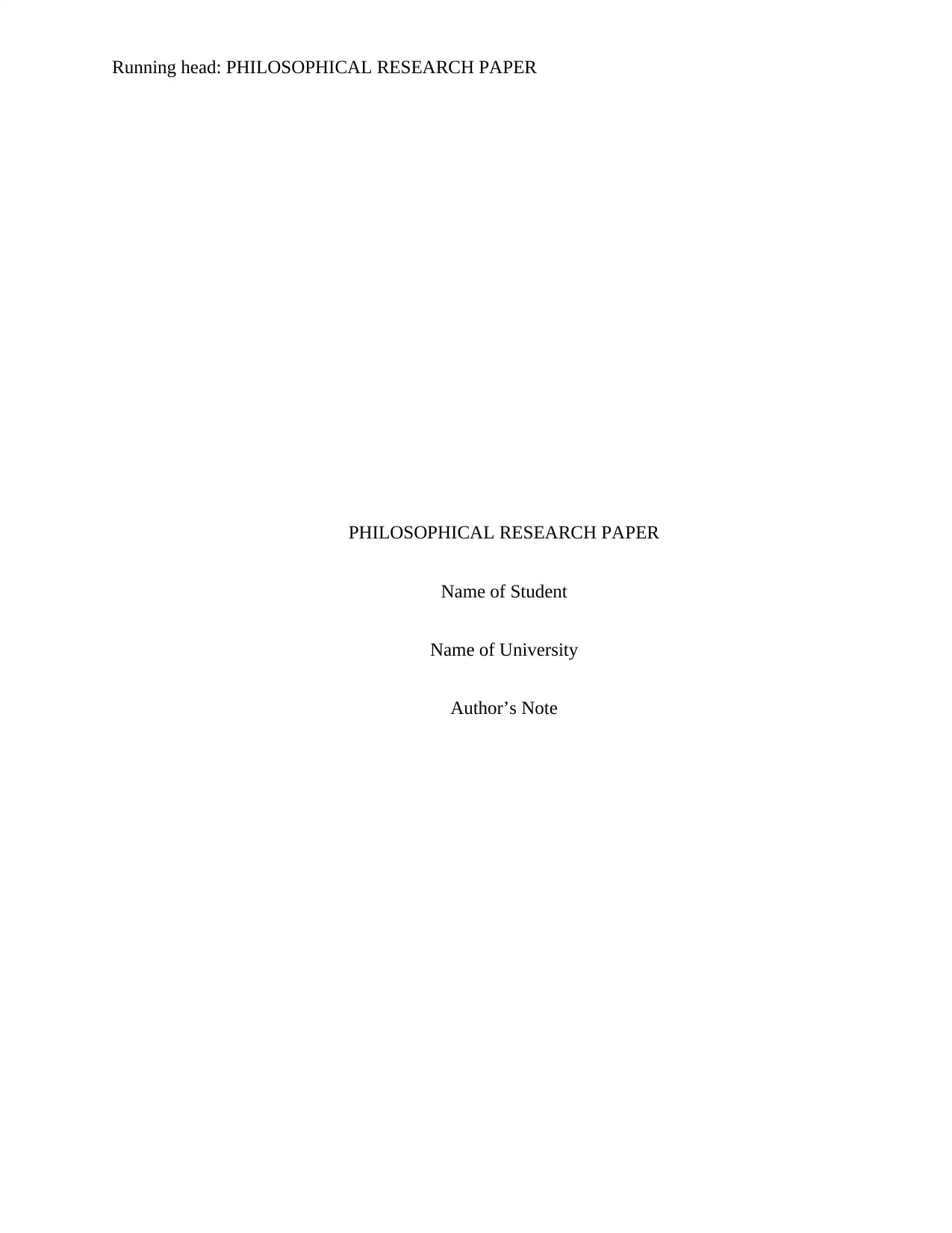
Running head: PHILOSOPHICAL RESEARCH PAPER
PHILOSOPHICAL RESEARCH PAPER
Name of Student
Name of University
Author’s Note
PHILOSOPHICAL RESEARCH PAPER
Name of Student
Name of University
Author’s Note
Paraphrase This Document
Need a fresh take? Get an instant paraphrase of this document with our AI Paraphraser
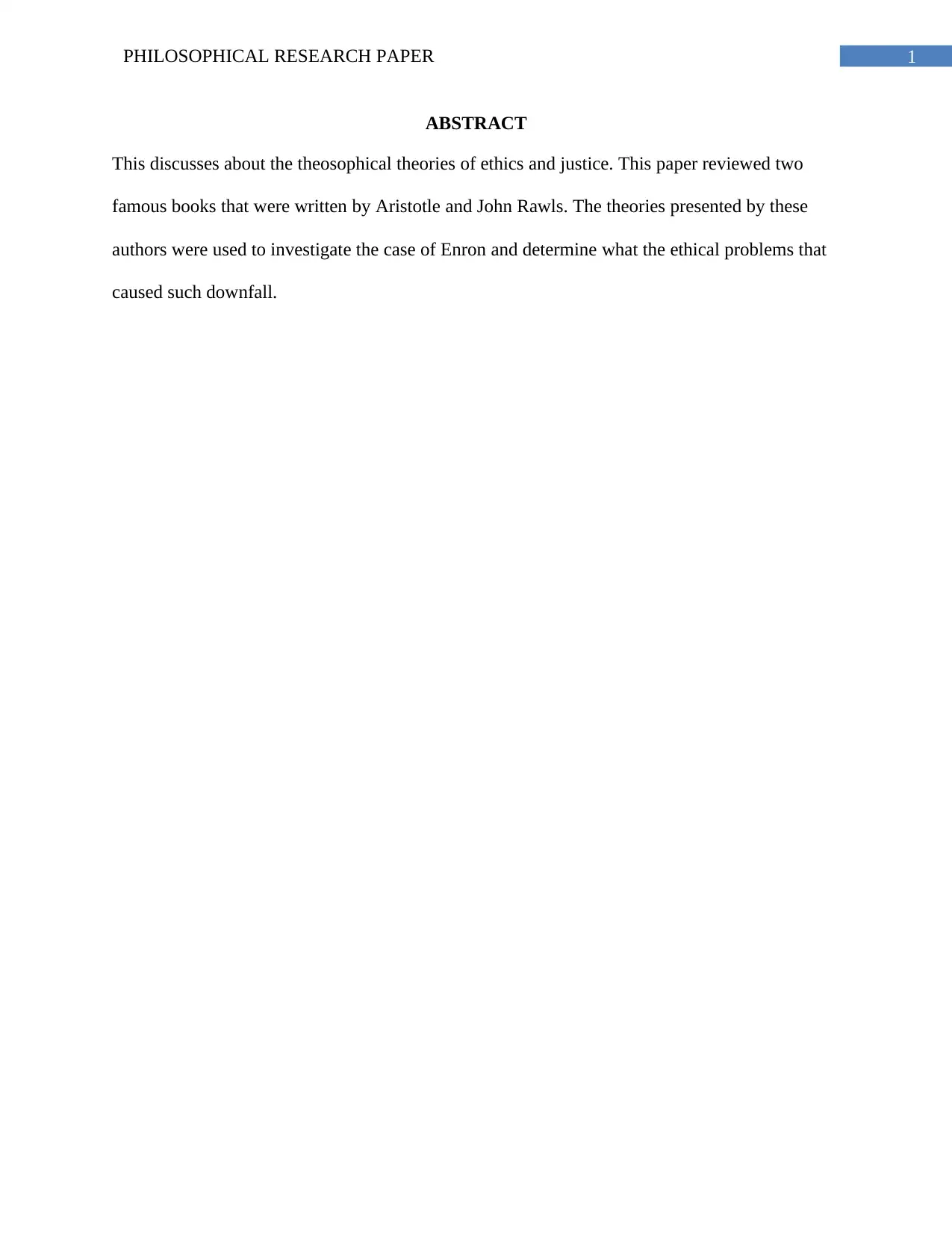
1PHILOSOPHICAL RESEARCH PAPER
ABSTRACT
This discusses about the theosophical theories of ethics and justice. This paper reviewed two
famous books that were written by Aristotle and John Rawls. The theories presented by these
authors were used to investigate the case of Enron and determine what the ethical problems that
caused such downfall.
ABSTRACT
This discusses about the theosophical theories of ethics and justice. This paper reviewed two
famous books that were written by Aristotle and John Rawls. The theories presented by these
authors were used to investigate the case of Enron and determine what the ethical problems that
caused such downfall.
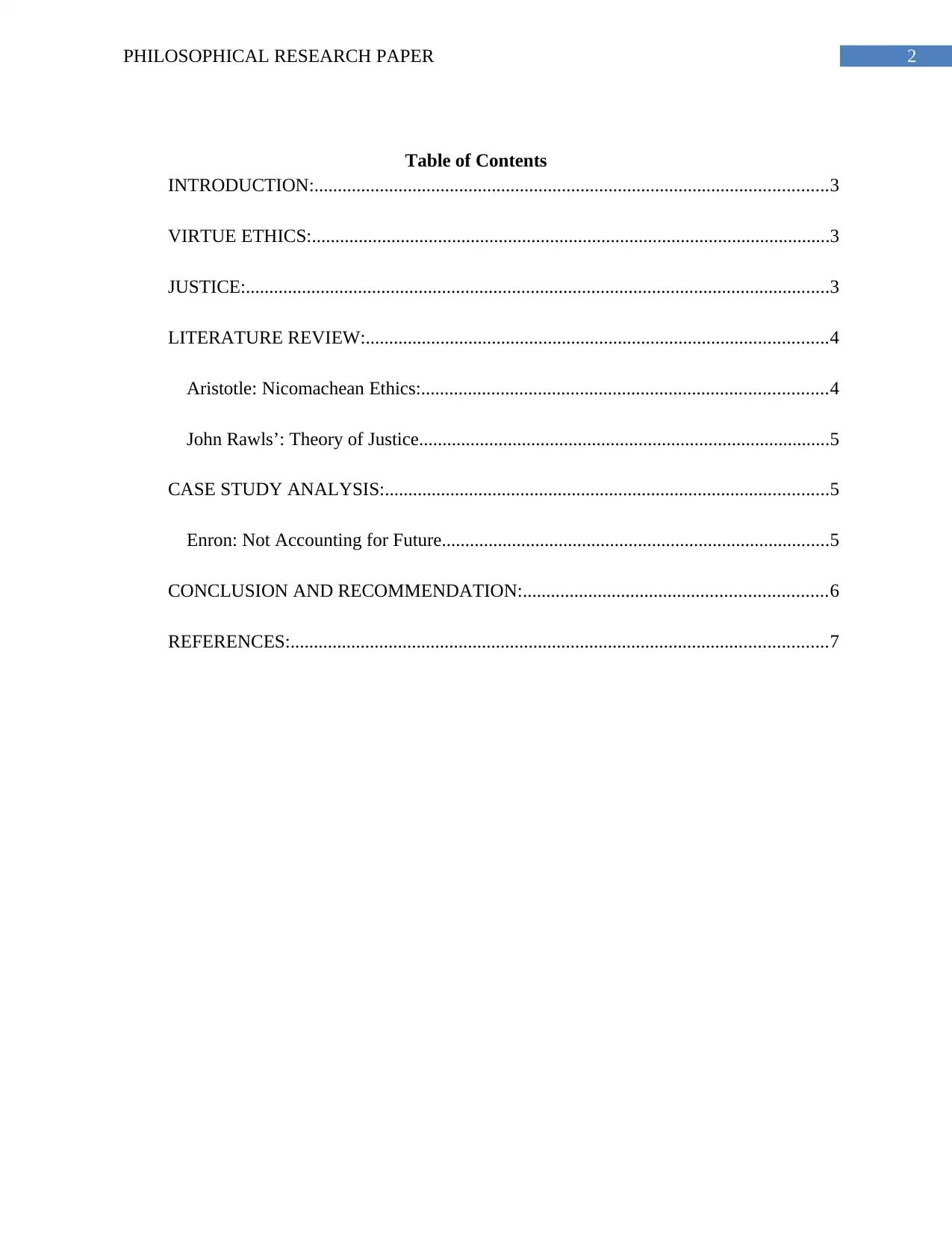
2PHILOSOPHICAL RESEARCH PAPER
Table of Contents
INTRODUCTION:..............................................................................................................3
VIRTUE ETHICS:...............................................................................................................3
JUSTICE:.............................................................................................................................3
LITERATURE REVIEW:...................................................................................................4
Aristotle: Nicomachean Ethics:.......................................................................................4
John Rawls’: Theory of Justice........................................................................................5
CASE STUDY ANALYSIS:...............................................................................................5
Enron: Not Accounting for Future...................................................................................5
CONCLUSION AND RECOMMENDATION:.................................................................6
REFERENCES:...................................................................................................................7
Table of Contents
INTRODUCTION:..............................................................................................................3
VIRTUE ETHICS:...............................................................................................................3
JUSTICE:.............................................................................................................................3
LITERATURE REVIEW:...................................................................................................4
Aristotle: Nicomachean Ethics:.......................................................................................4
John Rawls’: Theory of Justice........................................................................................5
CASE STUDY ANALYSIS:...............................................................................................5
Enron: Not Accounting for Future...................................................................................5
CONCLUSION AND RECOMMENDATION:.................................................................6
REFERENCES:...................................................................................................................7
⊘ This is a preview!⊘
Do you want full access?
Subscribe today to unlock all pages.

Trusted by 1+ million students worldwide
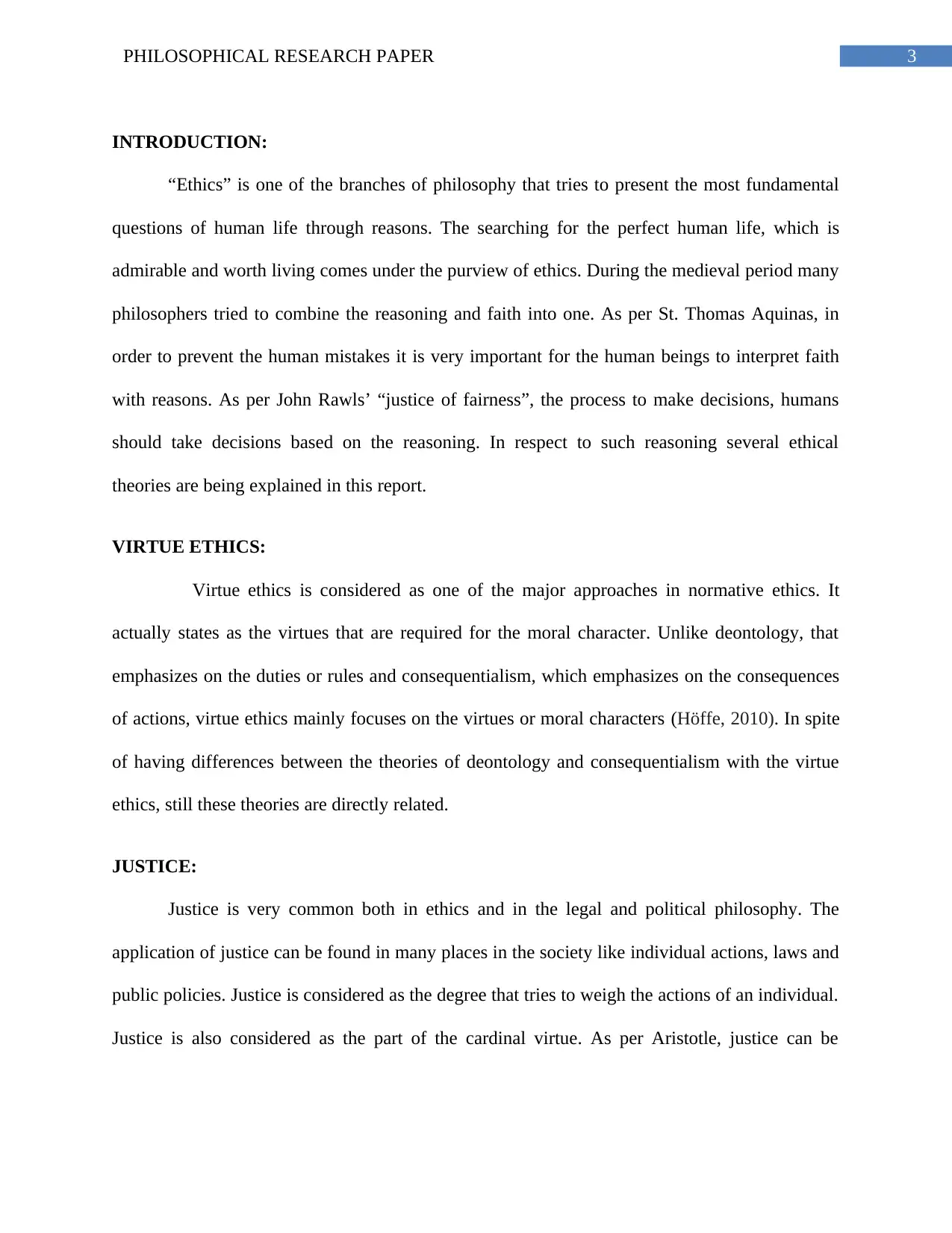
3PHILOSOPHICAL RESEARCH PAPER
INTRODUCTION:
“Ethics” is one of the branches of philosophy that tries to present the most fundamental
questions of human life through reasons. The searching for the perfect human life, which is
admirable and worth living comes under the purview of ethics. During the medieval period many
philosophers tried to combine the reasoning and faith into one. As per St. Thomas Aquinas, in
order to prevent the human mistakes it is very important for the human beings to interpret faith
with reasons. As per John Rawls’ “justice of fairness”, the process to make decisions, humans
should take decisions based on the reasoning. In respect to such reasoning several ethical
theories are being explained in this report.
VIRTUE ETHICS:
Virtue ethics is considered as one of the major approaches in normative ethics. It
actually states as the virtues that are required for the moral character. Unlike deontology, that
emphasizes on the duties or rules and consequentialism, which emphasizes on the consequences
of actions, virtue ethics mainly focuses on the virtues or moral characters (Höffe, 2010). In spite
of having differences between the theories of deontology and consequentialism with the virtue
ethics, still these theories are directly related.
JUSTICE:
Justice is very common both in ethics and in the legal and political philosophy. The
application of justice can be found in many places in the society like individual actions, laws and
public policies. Justice is considered as the degree that tries to weigh the actions of an individual.
Justice is also considered as the part of the cardinal virtue. As per Aristotle, justice can be
INTRODUCTION:
“Ethics” is one of the branches of philosophy that tries to present the most fundamental
questions of human life through reasons. The searching for the perfect human life, which is
admirable and worth living comes under the purview of ethics. During the medieval period many
philosophers tried to combine the reasoning and faith into one. As per St. Thomas Aquinas, in
order to prevent the human mistakes it is very important for the human beings to interpret faith
with reasons. As per John Rawls’ “justice of fairness”, the process to make decisions, humans
should take decisions based on the reasoning. In respect to such reasoning several ethical
theories are being explained in this report.
VIRTUE ETHICS:
Virtue ethics is considered as one of the major approaches in normative ethics. It
actually states as the virtues that are required for the moral character. Unlike deontology, that
emphasizes on the duties or rules and consequentialism, which emphasizes on the consequences
of actions, virtue ethics mainly focuses on the virtues or moral characters (Höffe, 2010). In spite
of having differences between the theories of deontology and consequentialism with the virtue
ethics, still these theories are directly related.
JUSTICE:
Justice is very common both in ethics and in the legal and political philosophy. The
application of justice can be found in many places in the society like individual actions, laws and
public policies. Justice is considered as the degree that tries to weigh the actions of an individual.
Justice is also considered as the part of the cardinal virtue. As per Aristotle, justice can be
Paraphrase This Document
Need a fresh take? Get an instant paraphrase of this document with our AI Paraphraser
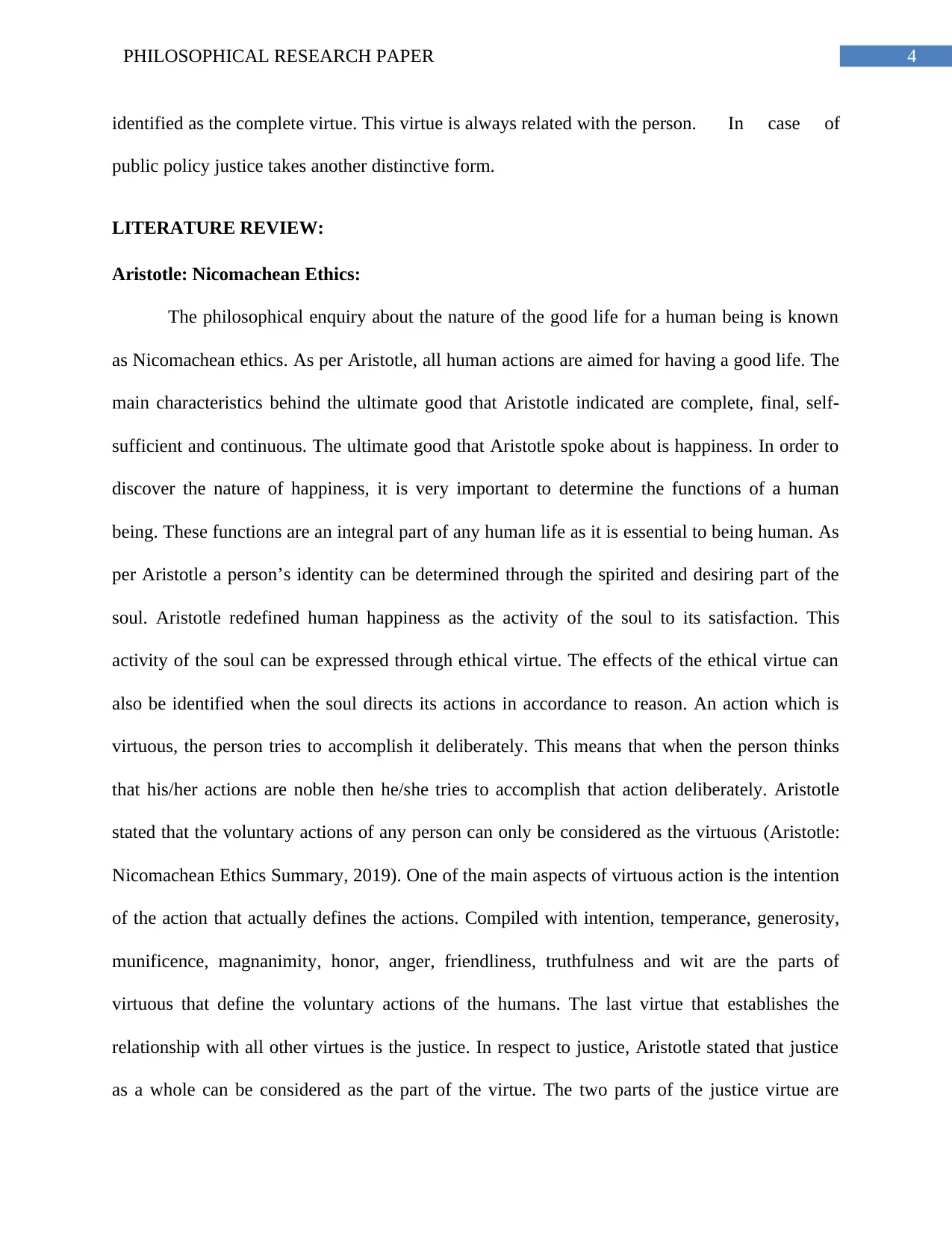
4PHILOSOPHICAL RESEARCH PAPER
identified as the complete virtue. This virtue is always related with the person. In case of
public policy justice takes another distinctive form.
LITERATURE REVIEW:
Aristotle: Nicomachean Ethics:
The philosophical enquiry about the nature of the good life for a human being is known
as Nicomachean ethics. As per Aristotle, all human actions are aimed for having a good life. The
main characteristics behind the ultimate good that Aristotle indicated are complete, final, self-
sufficient and continuous. The ultimate good that Aristotle spoke about is happiness. In order to
discover the nature of happiness, it is very important to determine the functions of a human
being. These functions are an integral part of any human life as it is essential to being human. As
per Aristotle a person’s identity can be determined through the spirited and desiring part of the
soul. Aristotle redefined human happiness as the activity of the soul to its satisfaction. This
activity of the soul can be expressed through ethical virtue. The effects of the ethical virtue can
also be identified when the soul directs its actions in accordance to reason. An action which is
virtuous, the person tries to accomplish it deliberately. This means that when the person thinks
that his/her actions are noble then he/she tries to accomplish that action deliberately. Aristotle
stated that the voluntary actions of any person can only be considered as the virtuous (Aristotle:
Nicomachean Ethics Summary, 2019). One of the main aspects of virtuous action is the intention
of the action that actually defines the actions. Compiled with intention, temperance, generosity,
munificence, magnanimity, honor, anger, friendliness, truthfulness and wit are the parts of
virtuous that define the voluntary actions of the humans. The last virtue that establishes the
relationship with all other virtues is the justice. In respect to justice, Aristotle stated that justice
as a whole can be considered as the part of the virtue. The two parts of the justice virtue are
identified as the complete virtue. This virtue is always related with the person. In case of
public policy justice takes another distinctive form.
LITERATURE REVIEW:
Aristotle: Nicomachean Ethics:
The philosophical enquiry about the nature of the good life for a human being is known
as Nicomachean ethics. As per Aristotle, all human actions are aimed for having a good life. The
main characteristics behind the ultimate good that Aristotle indicated are complete, final, self-
sufficient and continuous. The ultimate good that Aristotle spoke about is happiness. In order to
discover the nature of happiness, it is very important to determine the functions of a human
being. These functions are an integral part of any human life as it is essential to being human. As
per Aristotle a person’s identity can be determined through the spirited and desiring part of the
soul. Aristotle redefined human happiness as the activity of the soul to its satisfaction. This
activity of the soul can be expressed through ethical virtue. The effects of the ethical virtue can
also be identified when the soul directs its actions in accordance to reason. An action which is
virtuous, the person tries to accomplish it deliberately. This means that when the person thinks
that his/her actions are noble then he/she tries to accomplish that action deliberately. Aristotle
stated that the voluntary actions of any person can only be considered as the virtuous (Aristotle:
Nicomachean Ethics Summary, 2019). One of the main aspects of virtuous action is the intention
of the action that actually defines the actions. Compiled with intention, temperance, generosity,
munificence, magnanimity, honor, anger, friendliness, truthfulness and wit are the parts of
virtuous that define the voluntary actions of the humans. The last virtue that establishes the
relationship with all other virtues is the justice. In respect to justice, Aristotle stated that justice
as a whole can be considered as the part of the virtue. The two parts of the justice virtue are
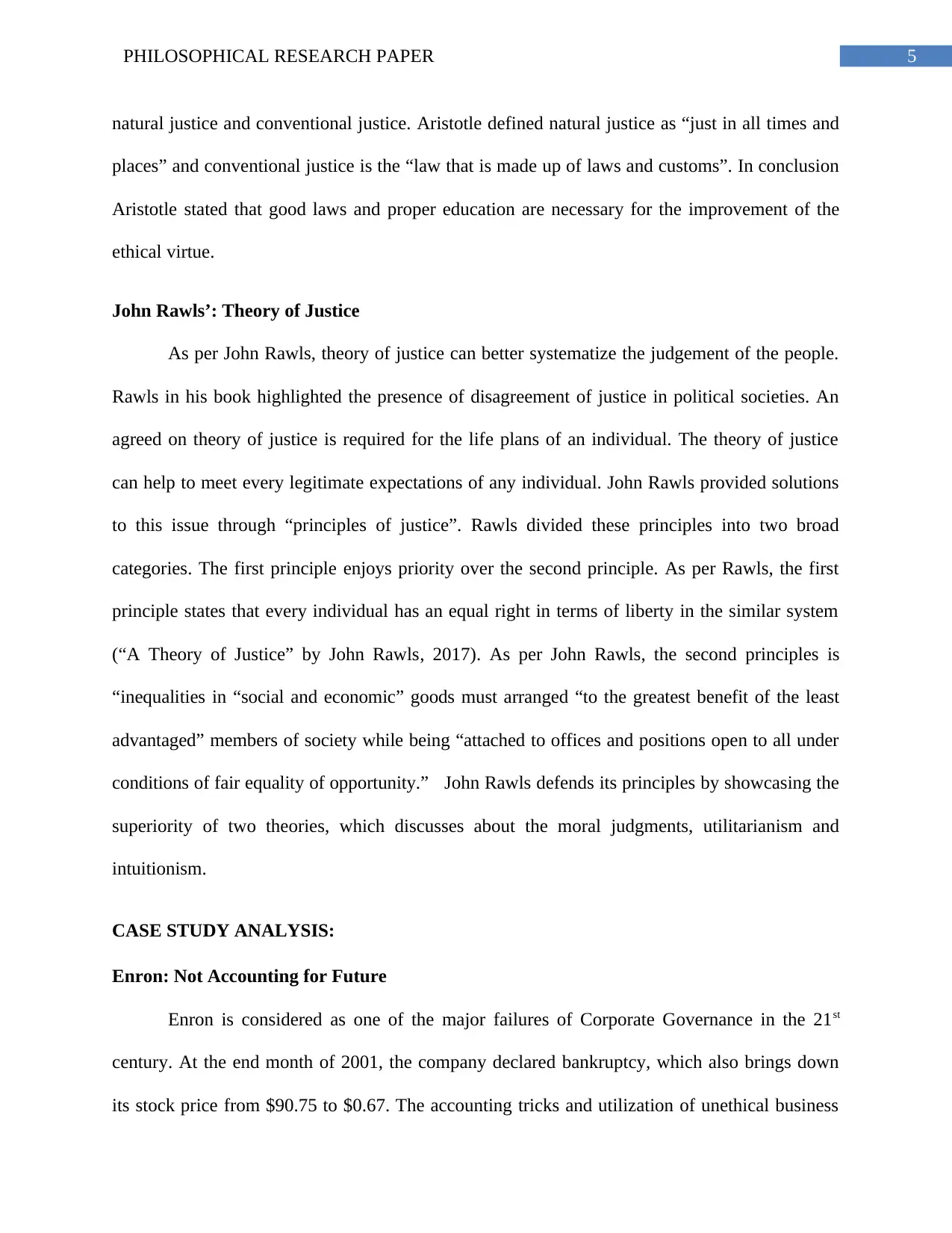
5PHILOSOPHICAL RESEARCH PAPER
natural justice and conventional justice. Aristotle defined natural justice as “just in all times and
places” and conventional justice is the “law that is made up of laws and customs”. In conclusion
Aristotle stated that good laws and proper education are necessary for the improvement of the
ethical virtue.
John Rawls’: Theory of Justice
As per John Rawls, theory of justice can better systematize the judgement of the people.
Rawls in his book highlighted the presence of disagreement of justice in political societies. An
agreed on theory of justice is required for the life plans of an individual. The theory of justice
can help to meet every legitimate expectations of any individual. John Rawls provided solutions
to this issue through “principles of justice”. Rawls divided these principles into two broad
categories. The first principle enjoys priority over the second principle. As per Rawls, the first
principle states that every individual has an equal right in terms of liberty in the similar system
(“A Theory of Justice” by John Rawls, 2017). As per John Rawls, the second principles is
“inequalities in “social and economic” goods must arranged “to the greatest benefit of the least
advantaged” members of society while being “attached to offices and positions open to all under
conditions of fair equality of opportunity.” John Rawls defends its principles by showcasing the
superiority of two theories, which discusses about the moral judgments, utilitarianism and
intuitionism.
CASE STUDY ANALYSIS:
Enron: Not Accounting for Future
Enron is considered as one of the major failures of Corporate Governance in the 21st
century. At the end month of 2001, the company declared bankruptcy, which also brings down
its stock price from $90.75 to $0.67. The accounting tricks and utilization of unethical business
natural justice and conventional justice. Aristotle defined natural justice as “just in all times and
places” and conventional justice is the “law that is made up of laws and customs”. In conclusion
Aristotle stated that good laws and proper education are necessary for the improvement of the
ethical virtue.
John Rawls’: Theory of Justice
As per John Rawls, theory of justice can better systematize the judgement of the people.
Rawls in his book highlighted the presence of disagreement of justice in political societies. An
agreed on theory of justice is required for the life plans of an individual. The theory of justice
can help to meet every legitimate expectations of any individual. John Rawls provided solutions
to this issue through “principles of justice”. Rawls divided these principles into two broad
categories. The first principle enjoys priority over the second principle. As per Rawls, the first
principle states that every individual has an equal right in terms of liberty in the similar system
(“A Theory of Justice” by John Rawls, 2017). As per John Rawls, the second principles is
“inequalities in “social and economic” goods must arranged “to the greatest benefit of the least
advantaged” members of society while being “attached to offices and positions open to all under
conditions of fair equality of opportunity.” John Rawls defends its principles by showcasing the
superiority of two theories, which discusses about the moral judgments, utilitarianism and
intuitionism.
CASE STUDY ANALYSIS:
Enron: Not Accounting for Future
Enron is considered as one of the major failures of Corporate Governance in the 21st
century. At the end month of 2001, the company declared bankruptcy, which also brings down
its stock price from $90.75 to $0.67. The accounting tricks and utilization of unethical business
⊘ This is a preview!⊘
Do you want full access?
Subscribe today to unlock all pages.

Trusted by 1+ million students worldwide
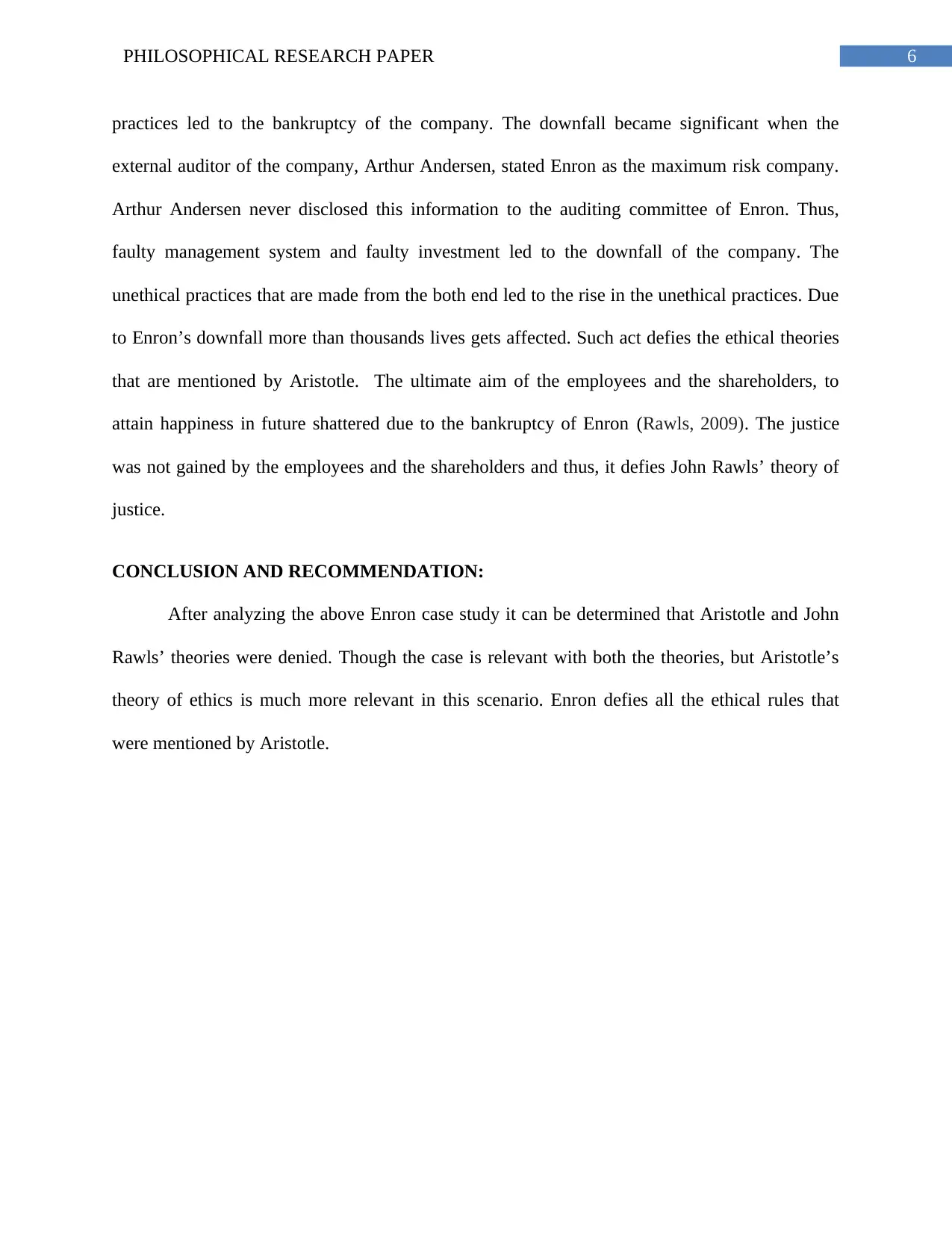
6PHILOSOPHICAL RESEARCH PAPER
practices led to the bankruptcy of the company. The downfall became significant when the
external auditor of the company, Arthur Andersen, stated Enron as the maximum risk company.
Arthur Andersen never disclosed this information to the auditing committee of Enron. Thus,
faulty management system and faulty investment led to the downfall of the company. The
unethical practices that are made from the both end led to the rise in the unethical practices. Due
to Enron’s downfall more than thousands lives gets affected. Such act defies the ethical theories
that are mentioned by Aristotle. The ultimate aim of the employees and the shareholders, to
attain happiness in future shattered due to the bankruptcy of Enron (Rawls, 2009). The justice
was not gained by the employees and the shareholders and thus, it defies John Rawls’ theory of
justice.
CONCLUSION AND RECOMMENDATION:
After analyzing the above Enron case study it can be determined that Aristotle and John
Rawls’ theories were denied. Though the case is relevant with both the theories, but Aristotle’s
theory of ethics is much more relevant in this scenario. Enron defies all the ethical rules that
were mentioned by Aristotle.
practices led to the bankruptcy of the company. The downfall became significant when the
external auditor of the company, Arthur Andersen, stated Enron as the maximum risk company.
Arthur Andersen never disclosed this information to the auditing committee of Enron. Thus,
faulty management system and faulty investment led to the downfall of the company. The
unethical practices that are made from the both end led to the rise in the unethical practices. Due
to Enron’s downfall more than thousands lives gets affected. Such act defies the ethical theories
that are mentioned by Aristotle. The ultimate aim of the employees and the shareholders, to
attain happiness in future shattered due to the bankruptcy of Enron (Rawls, 2009). The justice
was not gained by the employees and the shareholders and thus, it defies John Rawls’ theory of
justice.
CONCLUSION AND RECOMMENDATION:
After analyzing the above Enron case study it can be determined that Aristotle and John
Rawls’ theories were denied. Though the case is relevant with both the theories, but Aristotle’s
theory of ethics is much more relevant in this scenario. Enron defies all the ethical rules that
were mentioned by Aristotle.
Paraphrase This Document
Need a fresh take? Get an instant paraphrase of this document with our AI Paraphraser
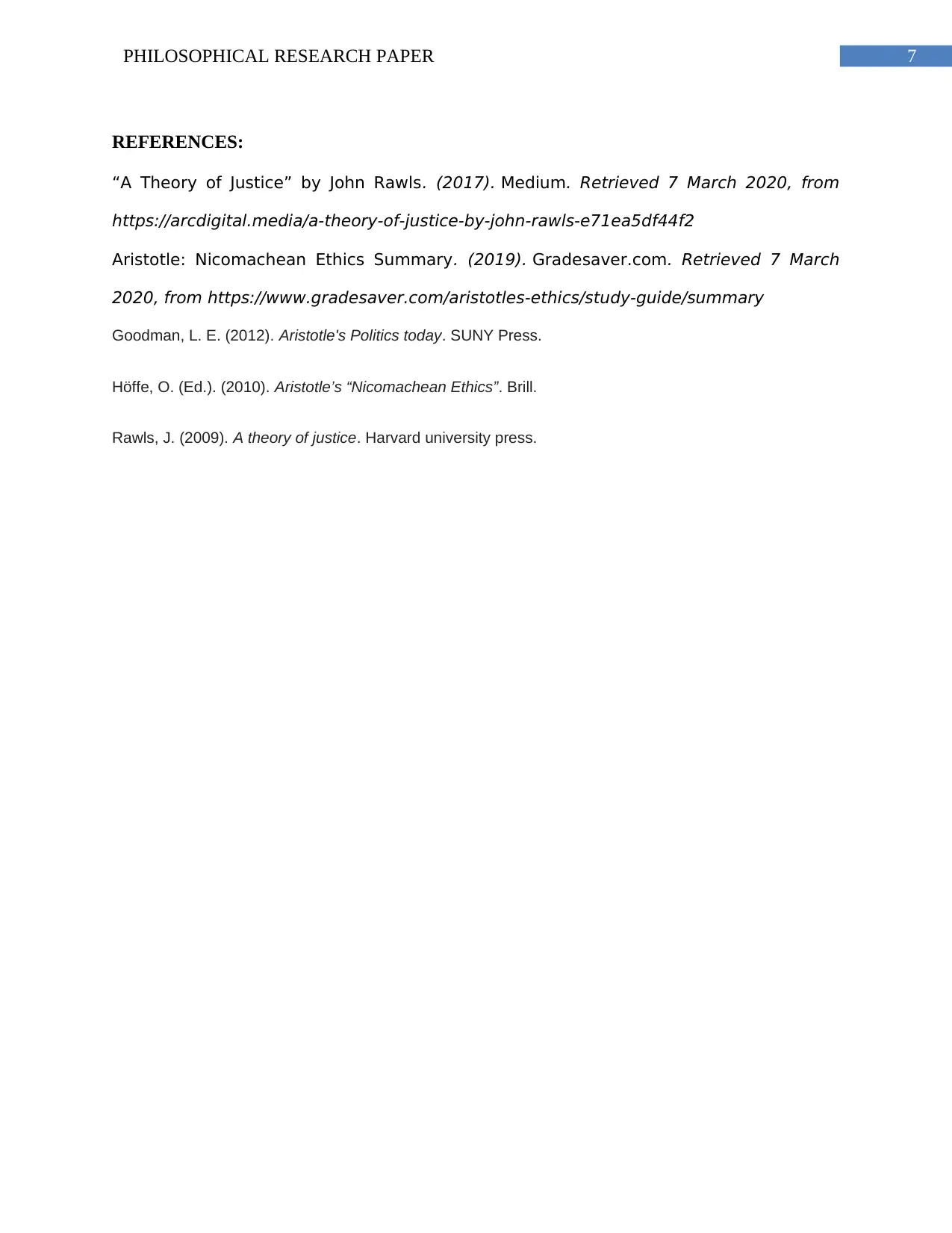
7PHILOSOPHICAL RESEARCH PAPER
REFERENCES:
“A Theory of Justice” by John Rawls. (2017). Medium. Retrieved 7 March 2020, from
https://arcdigital.media/a-theory-of-justice-by-john-rawls-e71ea5df44f2
Aristotle: Nicomachean Ethics Summary. (2019). Gradesaver.com. Retrieved 7 March
2020, from https://www.gradesaver.com/aristotles-ethics/study-guide/summary
Goodman, L. E. (2012). Aristotle's Politics today. SUNY Press.
Höffe, O. (Ed.). (2010). Aristotle’s “Nicomachean Ethics”. Brill.
Rawls, J. (2009). A theory of justice. Harvard university press.
REFERENCES:
“A Theory of Justice” by John Rawls. (2017). Medium. Retrieved 7 March 2020, from
https://arcdigital.media/a-theory-of-justice-by-john-rawls-e71ea5df44f2
Aristotle: Nicomachean Ethics Summary. (2019). Gradesaver.com. Retrieved 7 March
2020, from https://www.gradesaver.com/aristotles-ethics/study-guide/summary
Goodman, L. E. (2012). Aristotle's Politics today. SUNY Press.
Höffe, O. (Ed.). (2010). Aristotle’s “Nicomachean Ethics”. Brill.
Rawls, J. (2009). A theory of justice. Harvard university press.
1 out of 8
Related Documents
Your All-in-One AI-Powered Toolkit for Academic Success.
+13062052269
info@desklib.com
Available 24*7 on WhatsApp / Email
![[object Object]](/_next/static/media/star-bottom.7253800d.svg)
Unlock your academic potential
Copyright © 2020–2025 A2Z Services. All Rights Reserved. Developed and managed by ZUCOL.





